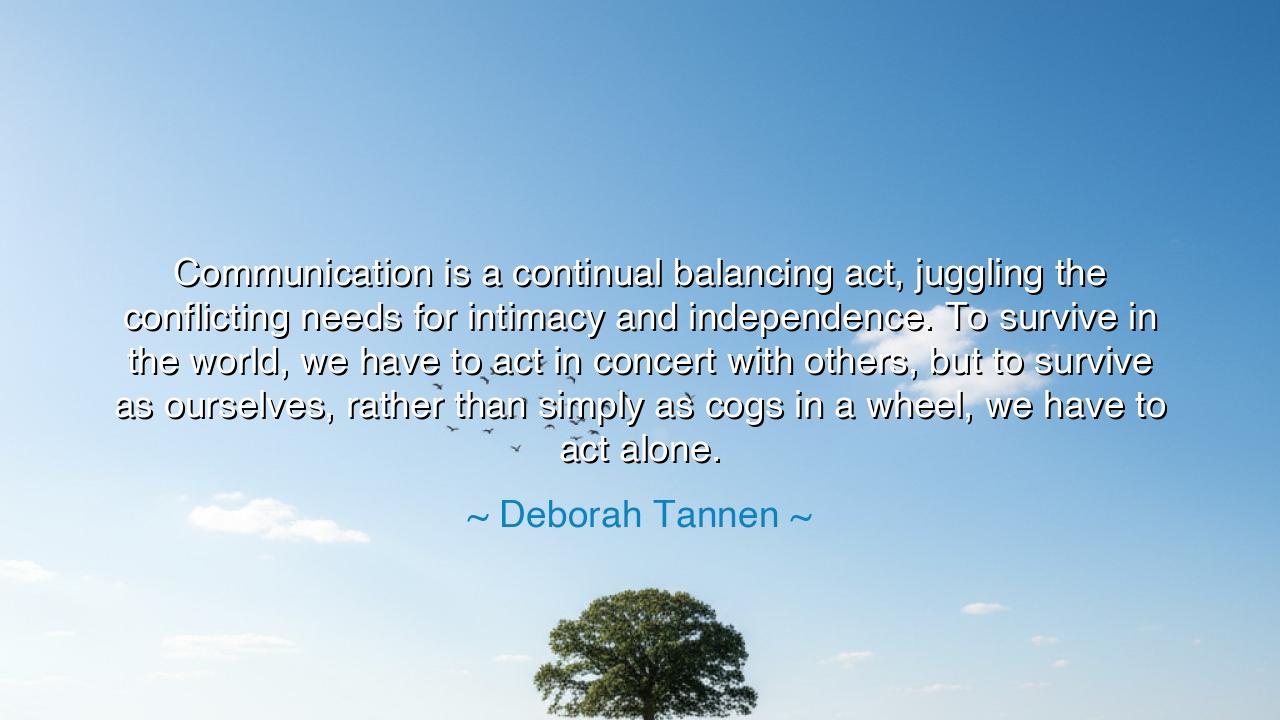
Communication is a continual balancing act, juggling the
Communication is a continual balancing act, juggling the conflicting needs for intimacy and independence. To survive in the world, we have to act in concert with others, but to survive as ourselves, rather than simply as cogs in a wheel, we have to act alone.






Host: The late afternoon light was dimming, casting a soft glow over the café where Jack and Jeeny sat, their conversation weaving in and out of pauses, as if the words were heavy but necessary. The hum of quiet voices and the clink of silverware around them seemed almost distant compared to the quiet intensity of their discussion. Jack had his elbows on the table, his fingers wrapped around his coffee cup, lost in thought. Jeeny sat across from him, her gaze steady but distant, as if searching for something in the flickering light.
Jeeny: She spoke first, her voice measured, yet carrying a quiet weight. “I came across something today, Jack. A quote from Deborah Tannen: ‘Communication is a continual balancing act, juggling the conflicting needs for intimacy and independence. To survive in the world, we have to act in concert with others, but to survive as ourselves, rather than simply as cogs in a wheel, we have to act alone.’”
Jack: His eyebrows furrowed slightly, processing the words as if trying to fit them into his own experiences. “A balancing act? That sounds like an impossible situation. How can you be both connected to people and still maintain your independence? Doesn’t one always end up sacrificing the other?”
Jeeny: She leaned forward slightly, her eyes meeting his, the serenity in her voice masking a deeper current. “But isn’t that the struggle, Jack? We all have this push-pull inside us, the need to be connected, to be understood, but at the same time, the need to be ourselves, to maintain a sense of autonomy. Tannen is pointing out that communication, real communication, isn’t just about being part of a group. It’s about finding a way to stay true to who you are, while still engaging with others.”
Host: The air between them grew thicker, as if the words themselves carried weight. The light outside was softening, but inside, the conversation felt like it had entered a more reflective space — one where both had to pause and consider what it meant to be truly connected, and yet independent.
Jack: He exhaled slowly, his gaze flicking down to his coffee cup before returning to her, his voice tinged with doubt. “But how do you even begin to find that balance? It’s like you’re always pulled in two directions. On one hand, you have to cooperate with others, meet their needs, share your thoughts, but on the other hand, you’re supposed to preserve your individuality. It’s like walking a tightrope — one wrong step, and you fall.”
Jeeny: Her smile was gentle, almost sympathetic, as if she understood the weight of his question. “Exactly. It’s not easy. But I think the key is learning when to step back and when to engage. There’s a difference between giving in a relationship and losing yourself in it. True intimacy comes when you feel comfortable enough to be vulnerable, but still hold onto your own identity. It’s about sharing parts of yourself without letting it consume who you are.”
Host: The room had quieted even further, the soft murmur of the world outside now only a distant hum. Jack shifted in his chair, the weight of her words settling into him, creating a deeper resonance between them. He looked out the window for a moment, lost in thought, before turning back to her.
Jack: His voice softened, the earlier skepticism replaced by a more introspective tone. “So, it’s not about complete separation or complete unity? It’s about knowing when to give, and when to take a step back? But isn’t that hard to figure out in the moment? How do you know when you’re giving too much or pulling away too far?”
Jeeny: She nodded slowly, her voice calm, but with an underlying strength. “It’s never perfect, Jack. There will always be moments when you give too much, or retreat too far. But it’s about being aware of it, being able to recognize when you’re compromising your sense of self for the sake of connection, and when you’re pulling away out of fear of losing yourself. It’s a dance, and sometimes it’s messy, but the goal is always to find that space where you’re both present in your relationships, but also still standing firm in who you are.”
Host: The light outside had now softened into twilight, the world beyond the café window muted by the darkness. The air inside felt quieter, more reflective, as if they had both arrived at an understanding that wasn’t fully defined but felt deeply true.
Jack: He sighed, leaning back slightly in his chair, a softer acknowledgment in his eyes. “I guess awareness is the first step. Knowing when to give, when to step back, when to be vulnerable, but also knowing when to hold onto yourself. It’s about balance, not perfection.”
Jeeny: “Exactly. It’s a constant dance, Jack. But the more you practice it, the easier it becomes to move fluidly between intimacy and independence.”
Host: The quiet in the room settled into a peaceful rhythm, the understanding between them growing clearer with each passing moment. Outside, the city was now fully dark, the glow from the café casting a warm light on the table between them. The world moved on, but for just a moment, it seemed that Jack and Jeeny had found the quiet place between connection and autonomy, where true communication could unfold — not as a perfect act, but as a continuous dance of awareness, respect, and understanding.






AAdministratorAdministrator
Welcome, honored guests. Please leave a comment, we will respond soon